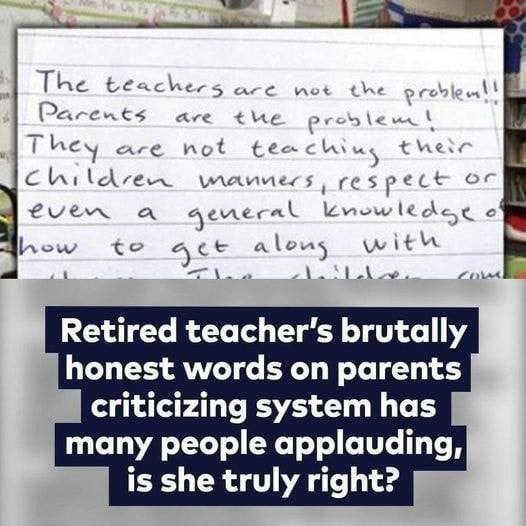In 2017, retired teacher Lisa Roberson wrote an open letter in the Augusta Chronicle that sparked a debate on the state of the education system. Roberson argued that the problem isn’t with teachers, as often claimed, but with parents. She criticized parents for not teaching their children respect, manners, or responsibility, pointing out that while some students come to school with expensive shoes, they often lack basic supplies like pencils and paper, which teachers have to provide.
Roberson questioned whether parents engage with teachers, attend parent nights, or ensure their children complete homework. She believed that if parents stepped up and took responsibility, the education system would improve. Her letter raised important questions about the role of parents in education and continues to fuel discussion on how to address issues within the school system.
Recognising the Signs of Emotionally Unavailable Parents

Have you often been dismissed or ignored as a child?
Is it impossible for you to emotionally connect to your parent?
Do you struggle with feeling not good enough, no matter how hard you try?
If so, chances are you grew up with emotionally unavailable parents, feeling rejected and invisible. Even if they met your basic physical needs, you probably still longed for the emotional bond you were deprived of, which can manifest as a persistent void and feelings of devaluation and neediness in adulthood. In the long term, a lack of emotional support and neglect of emotional needs can lead to mental health issues, such as relationship issues, low self-esteem, poor boundaries, anxiety, or depression.
Recognising the emotionally unavailable parents can often neglect their children’s emotional needs, leading to feelings of abandonment and insecurity. It is crucial for children to feel emotionally supported and validated by their parents in order to develop healthy emotional intelligence and self-esteem based on their own experiences. Parents who are emotionally unavailable may struggle to provide the necessary emotional guidance and nurturing that children require for their overall well-being, sometimes due to their own issues such as addiction. Signs of emotionally unavailable parents can be challenging, especially when that was your norm growing up. That’s why this article focuses on emotional unavailability, ways to recognise its signs and practical tips on overcoming this issue and taking steps towards healing.
Understanding Emotional Unavailability
Emotional availability is a foundation on which parents build a healthy relationship with their children. It creates a sense of emotional safety, which fosters learning, personal growth, and independence of their child [1].
However, if your parents were emotionally unavailable, they deprived you of those opportunities, leading you to feel confused, rejected, and starved for love and connection.
Perhaps you found yourself:
taking on adult responsibilities despite your young age
switching roles within the family – parenting the parents.
avoiding your parent due to their unreliability, self-centredness, and tendency to cause stress rather than providing support

The Impact of Emotionally Unavailable Parents on Children
Growing up with a cold mother syndrome can have lasting effects of emotionally unavailable parents on a person’s emotional well-being. Children of emotionally unavailable parents may struggle with forming healthy relationships and expressing their own emotions, often exhibiting narcissistic traits as a result. It is important for individuals who have experienced this type of upbringing to seek therapy or support to work through any unresolved issues and learn how to cultivate healthy connections in their lives.
Children of Emotionally Unavailable Parents: Issues in Adulthood
If you grew up with dysfunctional patterns instead of healthy role models, possibly due to your parent’s mental health issues, there’s a higher risk that, as an adult, you might struggle with:
- people-pleasing,
- poor boundary setting,
- fear of abandonment,
- relationship issues,
- substance abuse,
- lack of direction and identity,
- intense shame,
- low self-esteem [1],
- repressed anger,
- narcissistic and borderline personality traits,
- eating disorders,
- anxiety,
- Depression.



